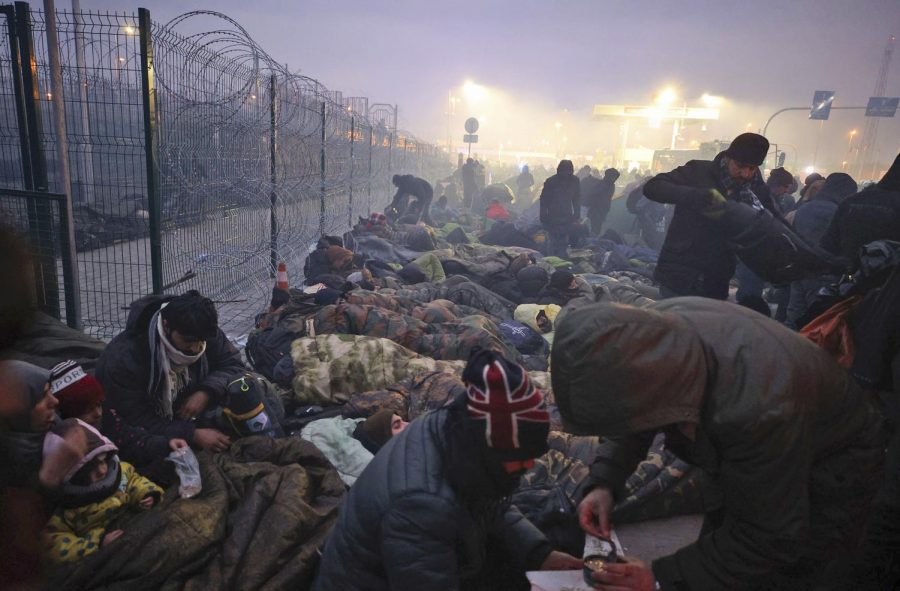The Poland-Belarus Border Crisis
Associated Press/Leonid Shcheglov
CRISIS AT THE BORDER: Migrants huddle for warmth at the “Kuznitsa” checkpoint at the Poland-Belarus border on Nov. 15.
The thousands of migrants sitting in freezing conditions with little to no food, water or medical help at the border of Belarus and Poland have begun to cause problems for the international community. Tensions between Belarus and Poland, as well as Russia and the European Union, of which Poland is a member, are drastically increasing the longer this crisis goes on.
Poland is currently governed by the Law and Justice party with Andrzej Duda as its president. According to the New York Times, the party’s aggressive anti-LGBTQ and xenophobic views, coupled with anti-Semitic attacks against the party’s last major presidential challenger in 2020, has earned the Law and Justice party no strong ideological allies in the E.U. or the Biden administration in the United States.
The Belarusian president, Aleksandr Lukashenko, is even more disliked by the Western international community. According to the New York Times, members of the E.U. refuse to discuss the border crisis with Lekashenko directly, as they see his rule as illegitimate due to his landslide win in August of 2020, which has led to Western observers calling the election fraudulent, and the ensuing protests that followed. Instead, they use Russian president Vladimir Putin as an intermediary — a man who does not have a particularly strong claim to a fair election win either.
Belarus and Poland do not agree on the border situation. Poland, and the rest of the E.U., see the mass of migrants freezing on their doorstep as a political ploy by Belarus and, by extension, Russia, in retaliation for the sanctions they served against Belarus due to previous human rights violations. According to CNN, the E.U. is accusing Belarus of giving these migrants visitor visas to the country and then escorting them to the border before leaving them there, unable to return to Belarus or enter Poland and the E.U. in order to destabilize the E.U.’s outermost border. They have also said that Belarus has been arming these migrants with tear gas, lasers and strobe lights to attack the Polish border guard. Belarus has accused Poland and the rest of the E.U. of ignoring these immigrants and lying about Belarus’ action to fabricate a reason to keep the migrants and rationalize their xenophobia. According to Reuters, Russia has agreed with Belarus’ handling of the border crisis, but they vehemently deny their involvement in the transportation of migrants and the keeping of them at the border.
According to the New York Times’ coverage of the Thursday, Nov. 11 meeting of the U.N. Security Council, these conflicting ideas have been brought to the international community. England, Estonia, France, Ireland, Norway, the United States and Albania all issued a statement after the conclusion of the council meeting stating their thoughts on the border crisis. They called it a human rights violation organized by Belarus for political gain and the destabilization of the E.U. But the Security Council and the U.N. are unlikely to take action as Russia is a permanent member of the Security Council and has veto power.
According to CNN, Russia flew two bombers over Belarus, and Ukraine began holding military drills at its border with Poland and Belarus in case the border crisis moves towards their border. After hearing news of these drills, U.S. Secretary of State Antony Blinken stated his worries over the escalating military force in the area and the possibility of a Russian invasion of Ukraine. Meanwhile, Putin has criticized the unscheduled U.S. and NATO exercises in the Black Sea. Tensions between Poland and Belarus have grown into tensions between the U.S. and E.U. with Russia.
But the people suffering on the front lines of this political battle must not be forgotten. As of Saturday, Nov. 13, according to a CNN article, there are 2,000 migrants at the border with the number likely to rise to 5,000 in the next week. These people are mostly from the Middle East and Asia, fleeing war for the safety of the E.U. These people are facing extreme conditions with winter fast approaching and Poland’s xenophobic government refusing to allow medical supplies to reach people at the border.
These people could be facing even harsher circumstances in the coming months. According to Reuters, as tensions escalate and more and more migrants are being armed by Belarus, Poland is threatening to use force against them. The Polish Prime Minister, Mateusz Morawiecki, wants to discuss a border wall funded by the E.U. to completely close their border with Belarus.
Tracking this conflict will be key in the future as it is related to tensions between Russia and the E.U., as well as the United States.

Samantha Wotring is a junior from Houston, TX concentrating in English and history. She has previously served as an Assistant News Editor and staff writer...










